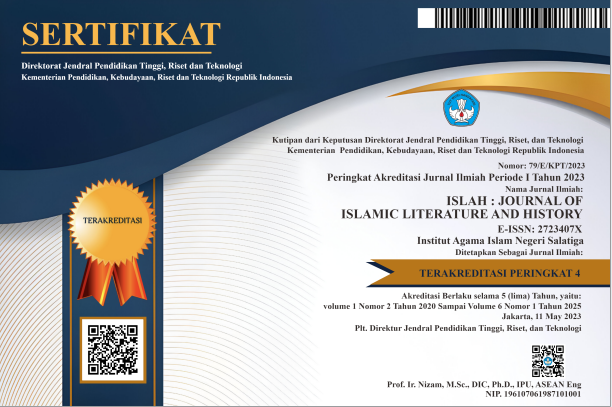Fundamentalism: Study of Islamic History
Abstract
This paper is a literary study by analyzing various thoughts from various readings. The concern of this study is about fundamentalism in the study of Islamic history. The discussion material includes; contextualization, history and various thoughts in response to fundamentalism. Regarding contextualization, a discussion arises whether fundamentalism exists as a product, as an agent, or both? If it is related to social changes in Islamic society in particular. Is Islamic fundamentalism more of a religion matters? Some refer to the events of the Iranian revolution in 1979, to the 18th century Wahhabi movement, some others point to the Al-Mihnah policy by the Mu'tazilah during the reign of the caliph Al-Ma'mun in the 9th century. There are even those who say that the genealogy of fundamentalism has existed since the beginning of Islamic history, namely the emergence of the Khawarij which is seen as having the same qualifications as contemporary fundamentalism. Responses to fundamentalists have been written in various ways, such as the assumption about the hegemonic nature of Western civilization which is said to be an obstacle to the accommodation of the basics of mutual equality, as well as an attitude of mutual respect and recognition. Other responses were in the form of proposals for the deconstruction of fundamentalism, the idea of developing Islamic values of compassion and moderation as a way or policy of dealing with fundamentalism.
Keywords
Full Text:
PDFReferences
El-Fadl, Khaled Abdul. 2005. “Selamatkan Islam dari Muslim Puritan”. Terj. Helmi Mustofa. Jakarta: PT. Serambi Ilmu Semesta.
Gierycz, Michal. 2020. “Religion: A or a Source of Fundamentalism Safeguard Against It?”. Journal Religions. Vol. 11, No. 104
Haar, Gerrie Ter, and James J. Bussuttil (ed). 2003. “The Freedom to do God’s Will”. London: Routledge.
Iqbal, Asep Muhamd, and Zulkifli. 2016. “Islamic Fundamentalism, Nation-state and Global Citizenship: The Case of Hizbut-Tahrir”. Indonesian Journal Of Islam and Muslim Societies, Vol. 6, No. 1.
Kingston, Paul. 1999. “Contextualizing Islamic Fundamentalism: Review Article”. International Journal Autumn. Association Professor of Political Saint Science, University of Toronto at Scarborough.
Koopmans, Ruud. 2015. “Religious Fundamentalism and Hostility againts Out-Groups: A Comparison of Muslim and Christian in Western Europe”. Journal of Ethnic and Migration Studies. Routledge. Taylor & Francis Group. Vol. 41, No. 1.
Maddeb, Abdelwahab. 2002. “The Malady of Islam”. Terj. Pierre Joris & Ann Reid. New York: Basic Books.
Marranci, Gabriele. 2009. “Understanding Muslim Identity: Rethinking Fundamentalism”. New York: Pub. Palgrave Macmillan.
Meyer, Mark Jurgens. 1993. “The New Cold War Religious Rationalism Confronts The secular Stage”. Barkeley: University of California Press.
Razaghi, Mohammad et.al. 2020. “Religious Fundamentalism Individuality and Collective Identity: A Case Study of Two Student Organizations in Iran”. Journals a Critical Research on Religion. Sage Pub.
Tibi, Bassam. 2000. “Ancaman Fundamentalisme”. Terj. Imran Rasyidi et.al. Jogja: Tiara wacana.
Tibi, Bassam. 2002. “Between Islam and Islamism: A Dialogue with Islam as a Pattern of Conflict Resolution and Security Approach Vis-a Vis Islamism” in “Redefining Security in the Middle East, Tami Amanda Jaoby & Brent E. Sasley (ed), Manchester University Press.
Tibi, Bassam. 2008. “Why They Can’t be Democratic”. Journal of Democracy. Vol. 19, No. 3.
Wahid, Abdurrahman. 2006. “Islamku Islam Anda Islam Kita”. Jakarta: The Wahid Institute.
Wahid, Abdurrahman. 2009. “Ilusi Negara Islam”. Jakarta: The Wahid Institute.
DOI: https://doi.org/10.18326/islah.v1i2.95-110
Refbacks
- There are currently no refbacks.
Copyright (c) 2023 Djamiatul Islamiyah

This work is licensed under a Creative Commons Attribution-ShareAlike 4.0 International License.
Publisher:
Faculty of Ushuluddin, Adab, and Humanities
Institut Agama Islam Negeri (IAIN) Salatiga
Jl. Nakula Sadewa V No. 9, Kota Salatiga, Jawa Tengah 50722
Lt. 2 Gedung Skretariat Fakultas Ushuluddin Adab dan Humaniora














